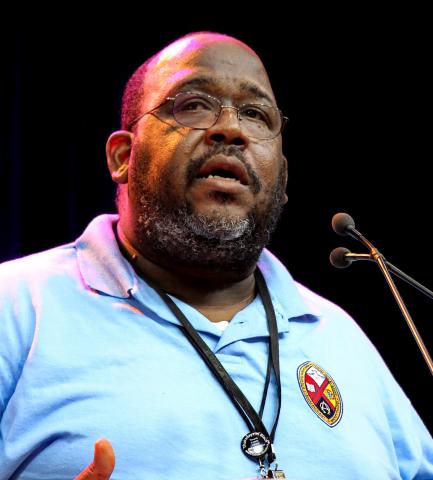Rev. Dr. Paul Douglas Walfall writes that to be prophetic in the face of racial intolerance is to proclaim the extravagant grace of God.

Dear friends,
I have been troubled by the reports in the news media of the occurrences of violence associated with racial issues. The events which happened recently in Red Deer and in North East Edmonton, Alberta were concerning, partly because they were coming to close to home. Yet, the honest reality is that these situations seem to be occurring across Canada. Unfortunately, they seem to be occurring with an increased frequency. These events should be of concern for all persons in our society.
In many of these instances, some are speaking but no one is willing to listen to each other. It needs to be stated again, that when people say that there is systemic racism in Canada it is not a moral judgement against anyone. It is not to suggest that people are not good and caring. It is, however, to soberly acknowledge that, systemically, a Black or an Indigenous person is more likely to be at a disadvantage when dealing with the institutions and policies in our nation. It does not suggest that there are no disadvantaged White people in our society. But it does call the attention to the experience I had of standing on the LRT in Edmonton, dressed in a suit and my best clergy shirt, and still I could hear some one whisper, “Watch that Black guy, he may be up to no good.” (I was the only Black person on that LRT car at that moment.) You see, an assumption was made about me based on one reason and one reason alone. What other assumptions are being made about me, I ask?
John Wesley, the founder of Methodism, once wrote:
Solitary religion is not to be found there. “Holy Solitaries” is a phrase no more consistent with the gospel than Holy Adulterers. The gospel of Christ knows of no religion, but social; no holiness but social holiness. Faith working by love, is the length and breadth and depth and height of Christian perfection. (John Wesley, Hymns and Sacred Poems (1739), Preface, page viii.)
I like Wesley’s emphasis on social holiness; it is a reminder to me that all the faith I have at home and in the church building must be seen and expressed every time when I encounter people. Holiness is here not to be understood as “holier-than-others,” instead it means being a disciple of Jesus. It means to love God so much that your life is transformed by that love. It is by our living out our faith that we are helping to make this world a better place. Yet I also believe that this requires us to be intentional about showing our faith. It is more than what we say; it is what we say, do, and live will show to others the love of God that we have experienced and how that love has transformed our living.
As I reflect on the current intolerance about race that seems to have gripped our society, I wonder if we need to be intentional about enabling social holiness. There is need for society to be transformed by justice, righteousness, and right relations. This occurs when we live the love of God that we have experienced. It also means a move away from being judgmental, mean, and unloving to others. It is reminder to us that we are called to reflect the love and grace of God in all our encounters and relationships in society. When we do so, we are in fact making a prophetic response to the society. To be a prophet is to proclaim the will of God to the people. To be prophetic in the face of racial intolerance is to proclaim the extravagant grace of God by the way we live. We show this in how we live: that all are loved by God, all are accepted by God and that none are inferior, and that the cries and concerns of those who have been marginalized is not forgotten by God. This is what Jesus would have done.
May we, who have known this matchless love which God gives, we who know the ways that this love transforms and changes, we who know the life-giving quality of God’s grace, be willing to live it. May we in this time of COVID, unemployment, fear, suspicion and heightened intolerance show that we are followers of Jesus Christ by the way we love! May the love we reflect continue to change the world.
More anon,
Rev. Paul
—Rev. Dr. Paul Douglas Walfall is the ministry personnel in the Fort Saskatchewan Pastoral Charge in Northern Spirit Regional Council.
The views contained within these blogs are personal and do not necessarily reflect those of The United Church of Canada.